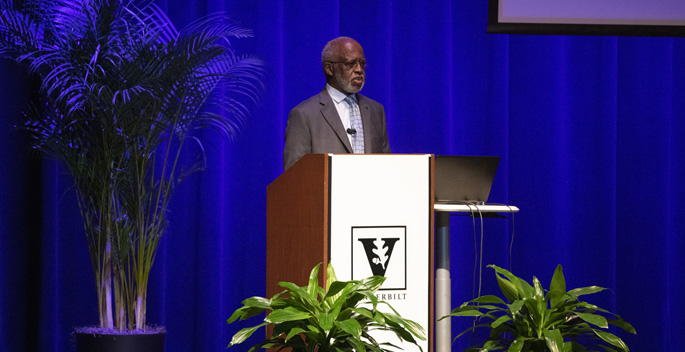
At Tuesday’s Levi Watkins Jr. MD Lecture, George C. Hill, PhD, Vanderbilt University Distinguished Professor Emeritus of Pathology, Microbiology and Immunology and Levi Watkins Jr. MD Professor Emeritus, delivered the keynote address, “Dr. Levi Watkins and Mr. Vivien Thomas: Memories and Lessons Learned from Two Outstanding Lives of Service.”
“Levi Watkins Jr. and Vivien Thomas lived very distinguished lives and contributed to medicine in many, many ways,” Hill said. “They were both African American gentlemen who grew up in the South — Watkins in Montgomery and Thomas in Nashville. They made significant contributions in medicine. They experienced pain and disappointment in their lives. They were innovators, mentors and teachers. They were modest individuals and humble. They both were Vanderbilt trained. They established careers at Johns Hopkins and received esteemed honors, both honorary degrees. Friends and family were very important to them.”
A Nashville native, Thomas secured a job as a laboratory assistant in 1930 with Alfred Blalock, MD, at Vanderbilt University, mastered complex surgical techniques and research methodology and taught legions of future surgeons. Due to the institutional racism at the time, Thomas was classified and paid as a janitor. By the mid-1930s, he was doing the work of a postdoctoral researcher in Blalock’s lab. Thomas’ work led to several life-saving surgical techniques, though he was not credited for his role at the time. In 1940, Thomas followed Blalock to Johns Hopkins and in 1944 assisted with the first “blue baby” surgery.
“This lecture is a very special time for us at the Medical Center and School of Medicine as we celebrate Dr. Watkins, who was the first African American student in our School of Medicine,” said Consuelo Wilkins, MD, Senior Vice President and senior associate dean for Health Equity and Inclusive Excellence. “He was a pioneer in so many ways in his career as a surgeon, but also in being a champion for diversity across the country, not just here at Vanderbilt but also at Johns Hopkins where he was on faculty for several years. He had a truly remarkable career and was passionate that we should embody equity, diversity, inclusion and justice.”
Watkins entered Vanderbilt University School of Medicine as the only Black student and remained the only one when he graduated with honors in 1970. He completed a general surgery residency at Johns Hopkins University Hospital, where he was the first Black chief resident of cardiac surgery. During his training, Watkins also conducted research at Harvard Medical School, where he investigated the relationship between congestive heart failure and the renin-angiotensin system.
In 1980, Watkins performed the world’s first human implantation of the automatic implantable defibrillator developed by Michael Mirowski and Morton Mower. He inspired significant racial equity and inclusion through student and faculty recruitment at Johns Hopkins in medicine and was a strong advocate for community service. He developed the cardiac arrhythmia service at Johns Hopkins and worked to address racial health disparities in research on coronary heart disease in African Americans.
In 1991, Watkins was promoted to full professor of cardiac surgery and dean for Postdoctoral Programs and Faculty Development at Johns Hopkins. He was also a civil rights advocate his entire life and advocated for addressing the health of community.
“Race played an important role in their early lives,” Hill said. “As we look forward to the next five to 10 years at Vanderbilt and examine ways in which we can be effective in addressing health disparity, racial participation and racial equity, we should keep in mind that these two gentlemen had a tremendous amount of courage; they had focused minds; they persevered, and they really made a contribution to what we are trying to do to achieve health equity. With leaders like Dr. Wilkins, Dean Balser and you, we can accomplish it.”
Kimberly Vinson, MD, associate dean for Diversity Affairs at VUSM, presented the Levi Watkins Jr. Awards.
Shari Barkin, MD, MSHS, received the faculty award for outstanding contributions to the institution and community in fostering opportunities for underrepresented minorities in educational, training and research programs.
Medical student Nicole Kloosterman and graduate student Kelsey McKnew received the student awards for their efforts to foster a more diverse environment that is enriching, encouraging and embracing of all Vanderbilt medical school students, faculty, staff and administrators.
Jasmine Walker, MD, MA, received the House Staff Award for her contributions in fostering opportunities for underrepresented minorities in VUMC’s educational, training and research programs.












